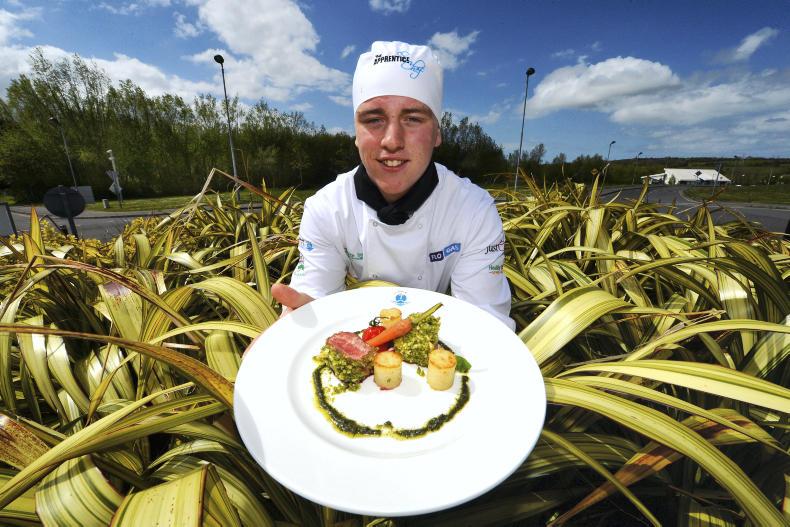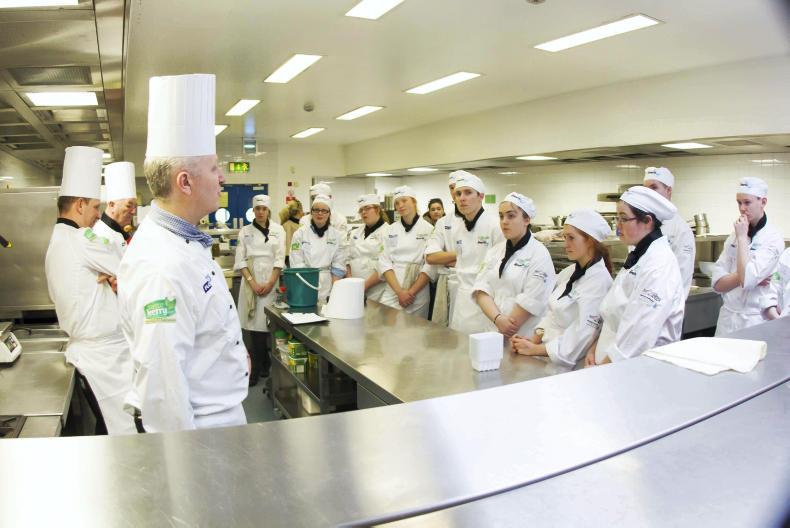Ordinary people would look in and think chaos or whatever but that’s my world, that’s the world that chefs work in and we don’t see it as chaos – we see it as like a symphony, it’s like an orchestra,” says Mark Murphy, who is a lecturer in Culinary Arts at the Institute of Technology Tralee.
There is no doubt he has passion for his chosen occupation and this passion is what probably led him, along with his co-founder Mark Doe (of Just Cooking Cookery School in Firies in Killarney), to establish the apprentice chef programme in 2012.
The two Marks founded this programme because they wanted to do something, said Mark Murphy, that “would be proactive in relation to our industry rather than the negative associations that are constantly termed with it”.
The programme sees schools bring students to IT Tralee for a series of workshops and demonstrations where the apprentice chef’s objectives are outlined. Each school is assigned a chef who mentors students by email, overseeing them produce a written project creating a recipe for a main course using fresh and local ingredients.
Mentors give the students advice and encouragement and help them develop and improve their chosen dish.
“Their dishes are continuously being prepared, the students take photographic evidence of them and they’re constantly in contact with their mentor,” says Mark.
Dishes are prepared and served at cook-offs in IT Tralee and the chefs of the best-produced dishes are selected to return for the grand final where they’ll produce their dishes for tasting and judging by a panel of experts. This year, the grand final is taking place on 11 May in IT Tralee.
“The idea was to expose students from second-level to the whole food industry as such, to help them experience the health and wellbeing and nutrition and to look at that whole area of food in a positive nature,” says Mark.
Students must source the produce for their dishes locally – from local suppliers in their region.
Mark says the emphasis of the programme is on learning outcomes rather than accomplishments: “It’s a programme, not a competition.”
Nearly 2,000 students have gone through the apprentice chef workshops since the programme began. While the students who have participated so far have been from Munster, the programme has ambitions to go nationwide.
To find out more about Apprentice Chef, visit www.theapprenticechef.ie.
Being a chef in Ireland
– where does it stand?
Cheffing as a profession currently poses many challenges.
“This year I’ll be up on 30 years in the industry and have I seen it improving over the last 25-30 years? No, as a matter of fact, I’ve actually seen it disintegrating to an extent,” says Mark Murphy.
One of the main problems in cheffing at the moment is the shortage of chefs. Official figures have put the current shortage of chefs in Ireland at between 5,500 and 6,000, but Mark says: “I can guarantee you it’s a lot more than that.”
He estimates that for this year there is a further 15-20% shortage on top of those figures.
“A lot of the issues are you’ve qualified, good-quality people leaving the industry because of the stress levels, because they can’t seem to cope due to the shortage of chefs.”
The volume of restaurants, bars and hotels in Ireland today compared to when Mark first started out has drastically increased and he says we don’t have the chef population to meet the demand – though he notes a chef shortage is “not just an Irish thing”.
Mark partially blames the shortage on employment conditions – he says there are people in the industry who don’t seem to see terms and conditions of employment as a priority: “There’s too high a percentage of people who don’t value their staff.”
According to Mark, the shortage of chefs has forced the industry to place people in positions they don’t have the requisite experience for. He gives the example of the type of candidate being produced by the Institute of Technology in Tralee.
“We’ve a very good-quality commis or an apprentice chef – or a person who is in the process of learning. They are not going out qualified, they are going out qualified as regards their certificate but as regards to being fully compliant, that’s an impossibility. But the problem is they’re going out to the industry and the industry is under so much pressure … and they’re not being mentored and that’s why you have the turnover you actually do.”
Mark believes a person should have a minimum of four or five years’ experience before they can be described using the term “chef”.
“You haven’t got a chef after a 12-week programme,” says Mark, “you haven’t even got a chef after a two-year full-time programme, what you’ve got is a commis chef, an apprentice chef. I’m not saying they are bad or poor chefs but what I’m saying is they’re not qualified enough to do the job and that’s unfortunately what you have in industry.”
Mark says he was working for five or six years before he was given the respect to be referred to by the term chef.
When chatting to Mark, his passion and love for cheffing is abundantly clear but he’s concerned: “It’s just when you see it going through what it’s going through at the moment. What I’m actually scared of is that I think it’s actually in a small bit of a freefall at the moment.”
However, the apprentice chef programme is one step that will help encourage more people into cheffing as a career.
“We do have students who would never have looked at this but who are going into our industry because of their positive experiences in the programme,” says Mark. CL






 This is a subscriber-only article
This is a subscriber-only article











SHARING OPTIONS: